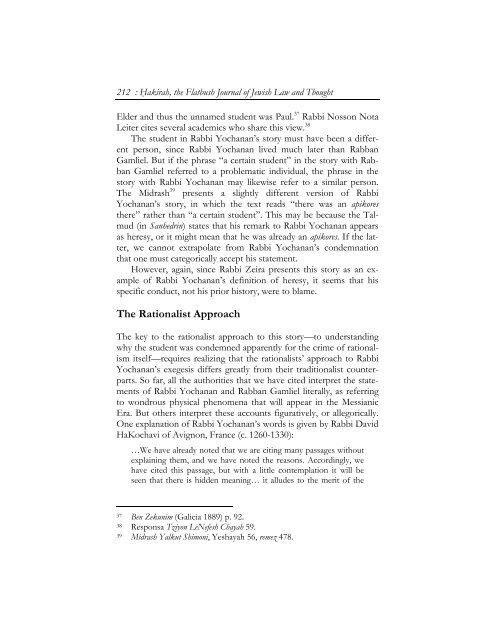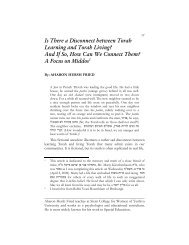Messianic Wonders and Skeptical Rationalists - Hakirah.org
Messianic Wonders and Skeptical Rationalists - Hakirah.org
Messianic Wonders and Skeptical Rationalists - Hakirah.org
Create successful ePaper yourself
Turn your PDF publications into a flip-book with our unique Google optimized e-Paper software.
212 : Hạkirah, the Flatbush Journal of Jewish Law <strong>and</strong> Thought<br />
Elder <strong>and</strong> thus the unnamed student was Paul. 37 Rabbi Nosson Nota<br />
Leiter cites several academics who share this view. 38<br />
The student in Rabbi Yochanan’s story must have been a different<br />
person, since Rabbi Yochanan lived much later than Rabban<br />
Gamliel. But if the phrase “a certain student” in the story with Rabban<br />
Gamliel referred to a problematic individual, the phrase in the<br />
story with Rabbi Yochanan may likewise refer to a similar person.<br />
The Midrash 39 presents a slightly different version of Rabbi<br />
Yochanan’s story, in which the text reads “there was an apikores<br />
there” rather than “a certain student”. This may be because the Talmud<br />
(in Sanhedrin) states that his remark to Rabbi Yochanan appears<br />
as heresy, or it might mean that he was already an apikores. If the latter,<br />
we cannot extrapolate from Rabbi Yochanan’s condemnation<br />
that one must categorically accept his statement.<br />
However, again, since Rabbi Zeira presents this story as an example<br />
of Rabbi Yochanan’s definition of heresy, it seems that his<br />
specific conduct, not his prior history, were to blame.<br />
The Rationalist Approach<br />
The key to the rationalist approach to this story—to underst<strong>and</strong>ing<br />
why the student was condemned apparently for the crime of rationalism<br />
itself—requires realizing that the rationalists’ approach to Rabbi<br />
Yochanan’s exegesis differs greatly from their traditionalist counterparts.<br />
So far, all the authorities that we have cited interpret the statements<br />
of Rabbi Yochanan <strong>and</strong> Rabban Gamliel literally, as referring<br />
to wondrous physical phenomena that will appear in the <strong>Messianic</strong><br />
Era. But others interpret these accounts figuratively, or allegorically.<br />
One explanation of Rabbi Yochanan’s words is given by Rabbi David<br />
HaKochavi of Avignon, France (c. 1260-1330):<br />
…We have already noted that we are citing many passages without<br />
explaining them, <strong>and</strong> we have noted the reasons. Accordingly, we<br />
have cited this passage, but with a little contemplation it will be<br />
seen that there is hidden meaning… it alludes to the merit of the<br />
37 Ben Zekunim (Galicia 1889) p. 92.<br />
38 Responsa Tziyon LeNefesh Chayah 59.<br />
39 Midrash Yalkut Shimoni, Yeshayah 56, remez 478.
















